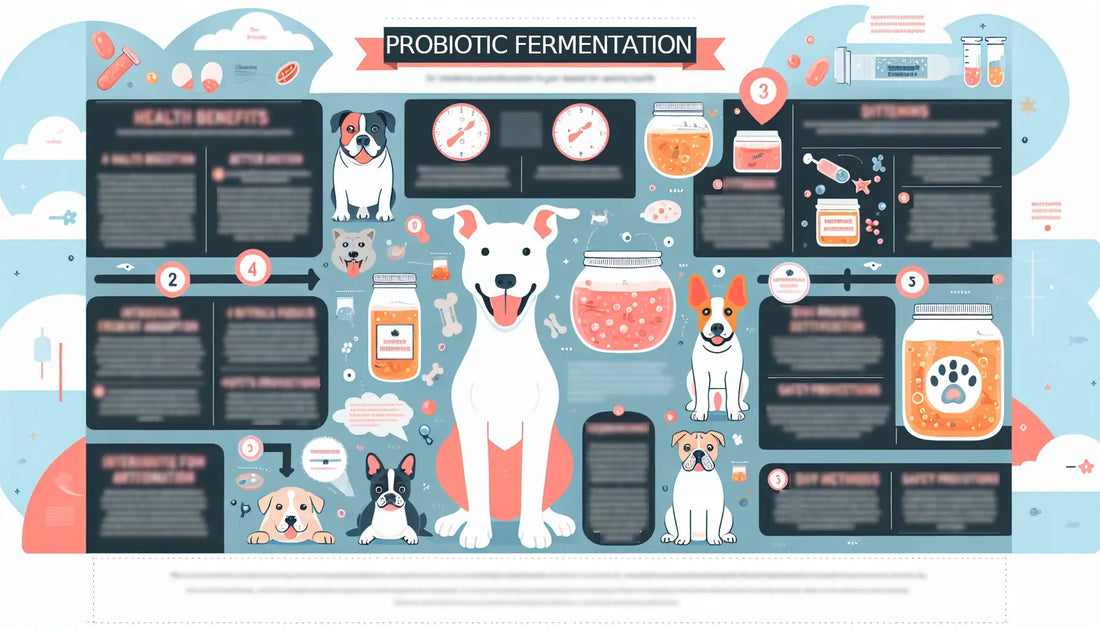Think of a magnificent Labrador Retriever, bouncing around with endless energy and feasting happily on his beloved treats. But what happens when this vibrant pooch begins to experience digestive troubles, lethargy, or decreased immunity? The answer might just surprise you: probiotic fermentation.
Probiotic fermentation is the natural process by which beneficial bacteria convert sugars and starches into lactic acid, promoting good health in a variety of ways. In the canine world, these probiotics play a critical role in maintaining gastrointestinal well-being and promoting nutrient absorption, making them invaluable for your furry friend's overall vitality.
Benefits of Probiotic Fermentation for Dogs
The advantages of introducing probiotics into a dog's diet via fermented foods are plentiful. Enhanced digestive health is chief among these, as these beneficial bacteria can aid in breaking down food, correcting imbalances in the intestinal tract, and promoting regular bowel movements. Better nutrient absorption ensures your dog gets the most out of their meals, while an improved immune system decreases their susceptibility to various illnesses.
- Enhanced Digestive Health: Probiotics in fermented foods aid in breaking down food, correcting imbalances in the gut, and promoting regular bowel movements, leading to improved digestive health.
- Better Nutrient Absorption: With improved digestion, dogs can absorb nutrients more effectively from their meals, ensuring they get the maximum benefit from their diet.
- Boosted Immune System: A healthy gut contributes to a stronger immune system, decreasing the dog's susceptibility to various illnesses and infections.
- Reduction of Gastrointestinal Disorders: Regular intake of probiotics can help prevent or alleviate common gastrointestinal disorders like diarrhea and constipation in dogs.
- Improved Overall Well-being: Beyond digestion, probiotics can positively impact overall well-being, including skin health, energy levels, and even mood regulation in dogs.
Types of Probiotic Fermented Foods Suitable for Dogs
The world of fermented foods is teeming with possibilities for your dog. Kefir, for example, is a creamy, nutritious beverage fermented from milk that's known for its rich probiotic content. Meanwhile, fermented vegetables like sauerkraut or kimchi introduce a flavorful crunch to your dog's dietary routine—just remember to keep the spices, garlic, and onion out of your canine-specific preparation!

How to Introduce Fermented Foods to a Dog's Diet
Any dietary changes should always be tackled gradually to avoid digestive upset. Initially, start with small quantities, and over time, slowly increase the portion of fermented goods in your dog's diet. Remember, each dog is unique—so be mindful of your pup’s reactions and adjust proportions accordingly.
- Start with Small Quantities: Introduce fermented foods in small amounts to avoid upsetting your dog's digestive system and gradually increase the portion over time.
- Monitor Your Dog’s Reaction: Pay close attention to your dog's response to fermented foods and adjust the proportions based on their tolerance and acceptance.
- Consistency is Key: Once you establish the right amount, include fermented foods consistently in your dog’s diet for best results.
- Variety of Fermented Options: Experiment with different types of fermented foods, such as kefir, yogurt, or fermented vegetables, to provide a range of probiotics and flavors.
- Consultation with a Veterinarian: Before making significant dietary changes, consult with a veterinarian, especially if your dog has existing health issues or dietary restrictions.
- Balance with Regular Diet: Ensure that fermented foods are a complement to, and not a replacement for, your dog’s regular balanced diet.
- Use Treats as Rewards: Utilize herbal supplement treats as rewards during training or as special treats to enhance their appeal and effectiveness.
DIY Fermented Foods for Dogs
Creating homemade fermented foods for your dog can be a rewarding experience. Simple recipes include fermenting vegetables like cabbage or carrots in brine or making your own kefir using milk and kefir grains. Be sure to research thoroughly, use high-quality ingredients, and ensure sanitary conditions to make the healthiest meals possible.
Safety and Precautions
Though fermented foods offer many benefits, not all dogs can tolerate them. For some—like a French Bulldog or Greyhound—fermented foods may cause unwanted gas or bloating. Therefore, it's best to introduce these foods slowly and monitor their effects. If adverse symptoms persist, seeking professional advice is essential.
Veterinarian Insights
Many veterinarians endorse the introduction of probiotics into a dog’s diet for maintaining gut balance and overall health. But, it’s always wise to consult with your vet, particularly if your dog has any pre-existing health conditions. If your Staffordshire Bull Terrier is gas- or bloating-prone, for instance, your vet can provide personalized advice on dietary alterations.
In conclusion, probiotic fermentation can greatly enhance your dog's overall health, but remember, a balanced diet is key. Combining these probiotic-rich foods with a robust herbal supplement can provide a more holistic approach. For example, our natural herbal treats priced at £19.99 with free delivery, offer a range of active ingredients beneficial to your dog's well-being. Our product comes with a money-back guarantee and the support of our UK-based customer care team.


